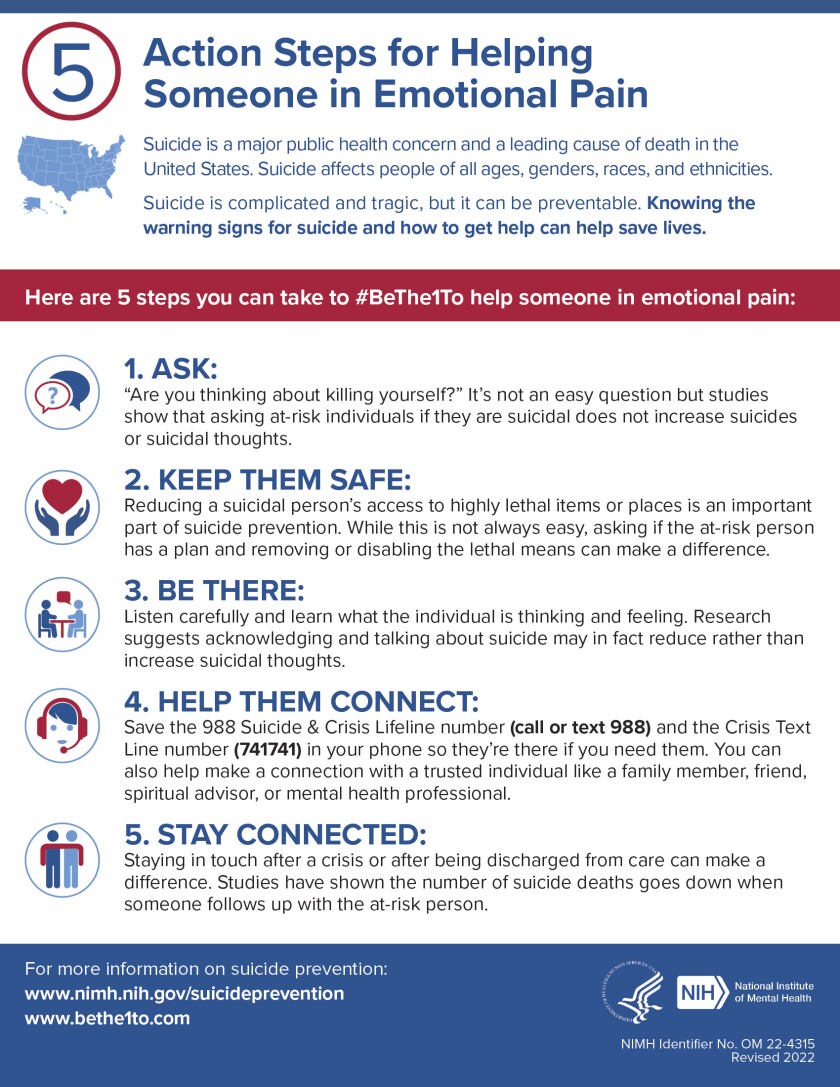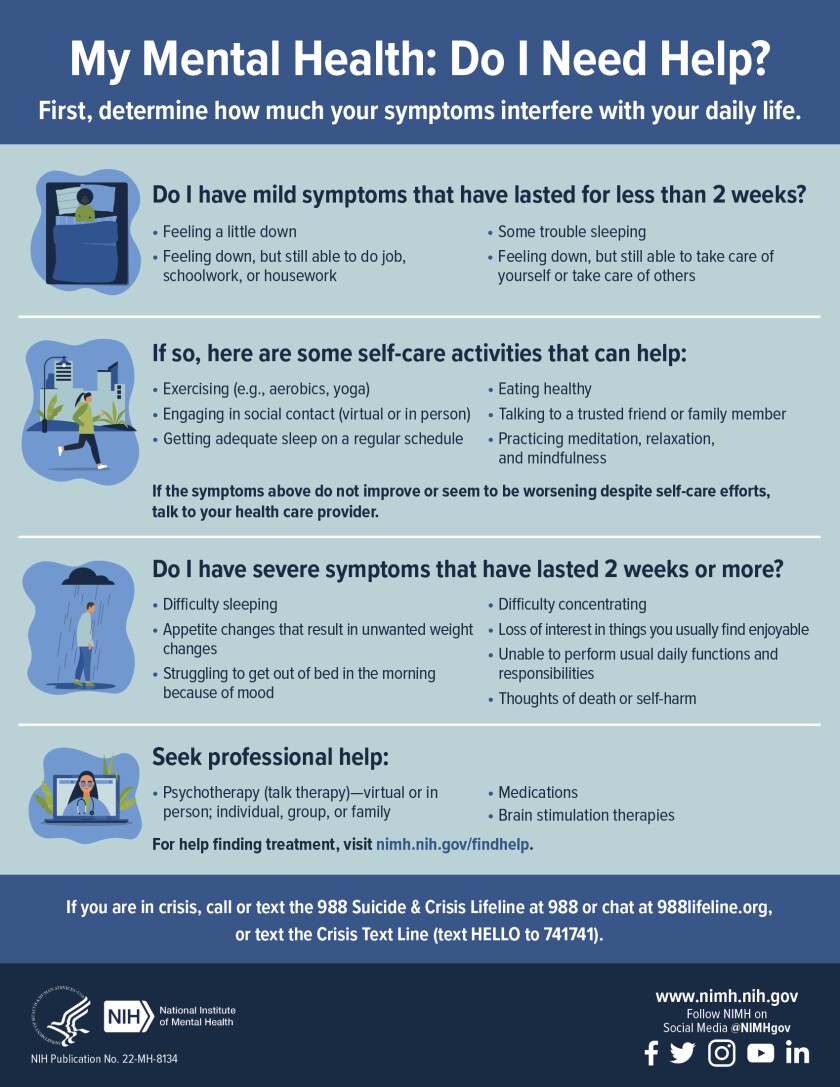
Tools to help teens cope with mental health issues – Park Rapids Enterprise
September is Suicide Awareness month, and Nevis High School students have been learning about resources available to help, including dialing or texting 988.
Professionals from Stellher Human Services and Lake Country Associates provided information to students. Donations from the Nevis Firepersons’ Relief Association and Painted Oaks paid for suicide prevention and mental health information and T-shirts with the suicide hotline number for students and staff.
This infographic presents behaviors and feelings that may be warnings signs that someone is thinking about suicide. Signs include: Talking about wanting to die, guilt, shame, or being a burden; feeling empty, hopeless, sad, anxious, or unbearable emotional or physical pain; and changing behavior such as making a plan to die, withdrawing, taking dangerous risks, mood swings, and using drugs and alcohol more often.
National Institute of Mental Hea
Nevis School social worker Heidi Wormley said parents are often hesitant to bring up issues like suicide, mental health and substance abuse with their teen.
“Parents are so scared because they know something is going on with their kid that they don’t know how to talk to them,” she said.
As parents, we sometimes just look at the school to fix everything. Parents have the job of building that foundation and then, we at the school, add more layers to it. Don’t ever give up on your kid. -Heidi Wormley, Nevis School social worker
Wormley said that, when teens bring up these topics with their parents or other adults, they should listen and take action.

This fact sheet presents five steps for helping someone in emotional pain in order to prevent suicide. The steps include: Ask, Keep Them Safe, Be There, Help Them Connect, and Stay Connected.
National Institute of Mental Hea
“When kids are talking about these things, they’re serious,” she said. “It takes a lot for someone to open up and say, ‘I feel like I’m going to kill myself’ or telling someone they are sad and depressed and don’t feel OK. That’s not easy to do. They might not say these things to their parents because they don’t want to hurt them or make them feel like they’re not good parents. So kids may say those things to other adults they trust. It’s important for kids to have other supportive adults in their life such as mentors, teachers and coaches.”
Wormley said when parents have a feeling something is wrong, they should listen to it.
“Your gut’s right,” she said. “When you have the feeling your kid is not OK, or you’re super worried about what is happening, you should pay attention to that. When kids’ habits, mindset and appearance change, those are all signs that there is something going on.

This fact sheet presents information about how to assess your mental health and determine if you need help. It provides examples of mild and severe symptoms, as well as self-care activities and options for professional help.
National Institute of Mental Hea
“The problem with parents, and I’m as guilty as anyone, is that we become so busy and stressed that we kind of forget these are our babies. When they get older we expect them to be more resilient and bounce back. But actually in grades 7-12, I think, kids need us more because there are so many things they have to work through. There’s lots to figure out. I always tell the kids I work with that their parents know them better than anybody else.”
She said cell phones can be a way for parents and kids to connect.
“If kids I’m working with have a concern they want to share with their parents, I encourage them to send it in a text,” Wormley said. “Parents can also text their kids to say they love them and are there for them.”
Take time to really listen
“One of the most important things parents can do to support their children is listen and be aware,” Wormley said. “A lot of times when kids go to their parents, they just want someone to listen to them so they can tell them how they feel. They don’t want them to fix everything all of the time.
“It’s really important for parents to set aside time to talk to their kids every day about what’s going on in their life. You need to make that time because schedules get so busy. Maybe it’s Wednesday night pizza every week. Use a lot of open-ended questions, let them express their ideas, and let them express what they are feeling without responding. Then you can come up with solutions together. Ask them what they think will work and how we can deal with this. Maybe it’s talking to your doctor, a pastor or a therapist.”
Wormley said it is important for parents to listen first, then pause before responding.
“Think before you react and process out the problem,” she said. “If a student is telling you they started vaping, find out why they made that decision.”
Wormley said project, event and activity times with a teen and parent gives them a neutral setting that makes it easier to open up.
“When they are little, we schedule special time with them,” she said. “Teens still need that. They are trying to figure it all out, figure how they fit into the world. They don’t know how to regulate their emotions. That first breakup, when someone says something mean to you, the first time you fail a test or don’t make a sporting team. Those are all new experiences.
“As adults, we need to validate their intense feelings and give them strategies to handle it by talking about what we did when something like that happened to us as a teenager. “
Open-ended questions can help get a conversation going.
“Ask what new thing they learned today, what dumb questions someone asked today, what teacher wore the worst outfit,” she said. “It doesn’t always have to be a serious topic.”
“Chemical influences in the adolescent brain are always going to cause some mental health issues,” Wormley said.
Wormley said some students say they vape to calm down. She said that type of self-medicating is a sign another issue needs to be addressed.
“They’re using for a purpose,” she said. “So you need to figure out what’s going on. Maybe they can’t sleep. Sometimes kids use chemicals because of past trauma they haven’t told us about that they need to work through.”
Wormley said students and parents with concerns can reach out to a teacher, school counselor or social worker.
“Parents need to be proactive in their search for mental health services for their kids,” she said. “That needs to be the front line. Mental health is just as important as their physical health. It’s our job as parents to make sure their mental health needs are being met.”
Build a strong foundation
Wormley said parents have more influence on their children than they realize.
“Some kids drink, some kids don’t drink. Why? It comes down to the tools those kids have built in their brains. ‘I don’t drink because I would never let my parents down.’ That’s why they choose what they choose.”
Wormley said it’s never too late to start building that foundation.
“You can’t give up,” she said. “When things are missing in the foundation, parents need to recognize the problem and help find solutions. As parents we sometimes just look at the school to fix everything. Parents have the job of building that foundation and then we at the school add more layers to it. Don’t ever give up on your kid.”







